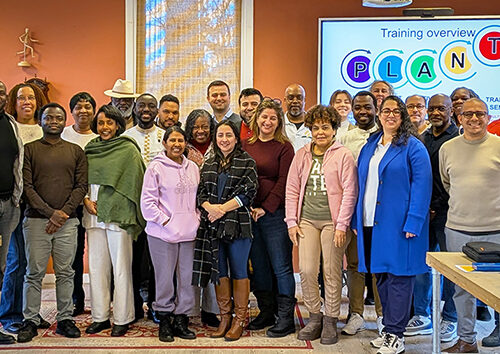15 November 2021 | St Albans, UK [Andreas Mazza, EUD News, ADRA Europe, Adventist Review with tedNEWS]
The agency’s financial support allowed for relief activities across the continent.
Since the pandemic’s beginning in March 2020, many people across the globe have experienced fear, loss, and uncertainty. Moreover, it is estimated that the COVID-19 pandemic pushed an additional 71 million to 100 million people into extreme poverty. However, Adventist Development and Relief Agency (ADRA) Europe teams, together with church volunteers, have responded by bringing hope and relief across seventeen counties. The projects reached over 19,000 households, with a combined funding of over half a million United States dollars (just over 370,000 pounds).
![A coronavirus greeting, ADRA Slovakia [Photos: supplied by Maja Ahac] ADRA Europe 500x300](https://ted.adventist.org/sitenews/wp-content/uploads/2021/11/images_ADRA_Europe_500x300.jpg)
The teams served on the frontlines by providing shelter and food for the homeless, supporting healthcare and mental health services, providing education, and helping the vulnerable, organization leaders said.
All projects implemented in Europe were run in partnership with local Seventh-day Adventist churches and focused on three main pillars: education, health, and livelihoods. The projects enabled children to receive some instruction even when the schools were closed. The projects also included a health aspect, with distribution of personal protective equipment and provision of psychosocial support. Finally, food and vouchers were distributed to support families in need, minorities, and the homeless.
“ADRA served on the frontlines by providing shelter and food for the homeless, supporting health-care and mental health services, providing education, and helping vulnerable seniors, youth, children, and families in Europe and around the world,” ADRA Europe leaders reported. “Indeed, we were all in this together,” they emphasized.
ADRA Europe expressed appreciation to everyone involved in these initiatives during the worst of the pandemic. “The ADRA Europe team expresses appreciation to every ADRA employee, volunteer, and leader for dedicated hard work, quick adjustments, sparkling humour, innovation, and creativity,” a release of the ADRA Europe Press Office said. “Yet, there is still a long way ahead of us. Poorer developing countries face even harder health and economic challenges on a long road to recovery,” it acknowledged, adding, “Solidarity with developing countries is a moral decision. Failure to pass this international solidarity test will leave deep wounds in countries left behind, paving the way for all manner of extremism and new crises — from pandemics to conflicts — which would threaten everyone.”
The release also emphasized the human aspect of the response during the crisis. “The world and its inhabitants had a painful lesson of a deeper understanding of human ties. We are all interconnected and are members of one human family,” it read. “As Seventh-day Adventist Christians, and as ADRA teams, we put people first and will continue to do so in the years to come, because we are in this together.”
____________
The original version of this story was published on the Inter-European Division News website.
tedNEWS Staff: Victor Hulbert, editor; Vanesa Pizzuto, associate editor
119 St Peter’s Street, St Albans, Herts, AL1 3EY, England
E-mail: [email protected]
Website: www.ted.adventist.org
tedNEWS is an information bulletin issued by the communication department of the Seventh-day Adventist Church in the Trans-European Division. Readers are free to republish or share this article with appropriate credit including an active hyperlink to the original article.



